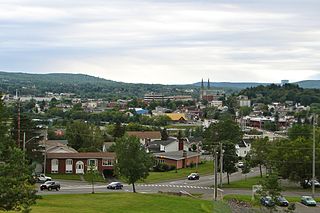Related Research Articles

Fredericton is the capital city of the Canadian province of New Brunswick. The city is situated in the west-central portion of the province along the Saint John River, which flows west to east as it bisects the city. The river is the dominant natural feature of the area. One of the main urban centres in New Brunswick, the city had a population of 58,220 in the 2016 Canadian Census. It is the third-largest city in the province after Moncton and Saint John.

New Brunswick is one of the ten provinces of Canada. It is one of the three Maritime provinces and one of the four Atlantic provinces. It is the only province with both English and French as its official languages.

Saint John is a seaport city of the Atlantic Ocean located on the Bay of Fundy in the province of New Brunswick, Canada. Saint John is the oldest incorporated city in Canada, established by royal charter on May 18, 1785, during the reign of King George III. The port is Canada's third-largest port by tonnage with a cargo base that includes dry and liquid bulk, break bulk, containers, and cruise. The city was the most populous in New Brunswick until the 2016 census, when it was overtaken by Moncton. It is currently the second-largest city in the province, with a population of 67,575 over an area of 315.96 km2 (121.99 sq mi).

Aroostook County is a county in the U.S. state of Maine along the Canada–U.S. border. As of the 2020 census, the population was 67,105. Its seat is Houlton with offices in Caribou and Fort Kent.

Edmundston is a city in Madawaska County, New Brunswick, Canada.

Kings County is located in southern New Brunswick, Canada. Its historical shire town is Hampton.

Saint John County is located in southern New Brunswick, Canada. The city of Saint John dominates the county. Elsewhere in the county, tourism is focused around the Bay of Fundy.

Gagetown is a village in Queens County, New Brunswick, Canada. It is situated on the west bank of the Saint John River and is the county's shire town.

Perth-Andover is a village in Victoria County, New Brunswick, Canada.

Harvey is a village in York County, in the Canadian province of New Brunswick. It is often called Harvey Station.

The St. Francis River is a river roughly 75 miles (120 km) long, which forms part of the Canada–United States border. The river rises in a lake of the same name located 12 miles (20 km) east of the Rivière du Loup in Quebec. The portion that forms the boundary starts at the bottom of Lake Pohenegamook at the very northernmost point of New England between Estcourt Station, Maine, and Estcourt, Quebec. The river along the international boundary flows south and then south-east through two deep, narrow lakes to its mouth on the Saint John River at St. Francis, Maine/Saint-François-de-Madawaska, New Brunswick.

The history of New Brunswick covers the period from the arrival of the Paleo-Indians thousands of years ago to the present day. Prior to European colonization, the lands encompassing present-day New Brunswick were inhabited for millennia by the several First Nations groups, most notably the Maliseet, Mi'kmaq, and the Passamaquoddy.

New Brunswick is one of Canada's three Maritime provinces. While New Brunswick is one of Canada's Maritime Provinces, it differs from its neighbours both ethnoculturally and physiographically. Both Nova Scotia and Prince Edward Island are either wholly or nearly surrounded by water and the ocean, therefore, tends to define their climate, economy and culture. New Brunswick, on the other hand, although having a significant seacoast, is sheltered from the Atlantic Ocean proper and has a large interior that is removed from oceanic effects. New Brunswick, therefore, tends to be defined by its rivers rather than its seacoast.

New Brunswick has had, since the Legislative Council was abolished by an act passed on 16 April 1891, a unicameral legislature called the Legislative Assembly of New Brunswick with 49 seats. The legislature functions according to the Westminster system of government. Elections are now held at least every five years but may be called at any time by the lieutenant governor on consultation with the premier.
The Canadian province of New Brunswick is divided into 340 local entities. New Brunswick has a single-tier municipal system in which all services are delivered either by the local municipality such as a town, village or city, or by the province itself to unincorporated areas organized as local service districts.